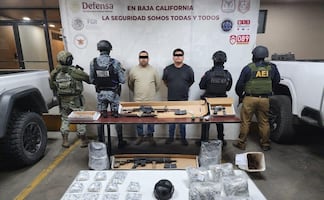If anyone in the Sinaloa Cartel knows about maximum security prisons, that is Dámaso López Nuñez, "compadre" of Joaquín "El Chapo" Guzmán.
"El Licenciado" (The lawyer), as López is better known, was head of Sinaloa's Judicial Police in Sinaloa, prosecutor and deputy director of security of the Puente Grande penitentiary in Jalisco around the time Guzmán escaped from this maximum security prison.
Court documents from Mexico and the United States show that one of the main lieutenants of El Chapo is an expert in high-security prisons, which explains how he may have had inside information on the security and surveillance systems.
According to testimonies gathered for the criminal case 16/2001-V, to which EL UNIVERSAL had access via the Transparency Law, López Nuñez was one of the employees of the penitentiary system that helped El Chapo escape on January 19, 2001.
López Nuñez was one of the officials who began selling privileges and relaxed discipline at the Puente Grande prison. The Attorney General's Office (PGR) refused to say whether or not there is an investigation in progress or if an arrest warrant against him has been issued.
In complicity with him, El Chapo and Héctor Luis "El Güero" Palma introduced forbidden items to their rooms, such as microwave ovens, cell phones, alcohol, viagra and drugs, as well as prostitutes that stayed with them in their cells for up to three days to celebrate their birthdays.
BRIBES
According to court documents "90% of the Puente Grande prison employees were paid various amounts ranging from 250 pesos (US$15.6) per day for guards, 9,000 pesos (US$563) a month for seconds-in-command and US$3,000 a month for commanders. The deputy director of internal security was paid US$5,000 a month."
Due to the position of López Núñez at the Puente Grande prison he covered the then director, Leonardo Beltrán Santana, when he missed work and attended meetings in which important decisions about the prison operation were taken. He was also part of the Interdisciplinary Technical Council that decided issues such as the incentives given to inmates or visitation.
"El Licenciado" resigned to his position on September 30, 2000, a few months before the escape of El Chapo in 2001, but continued visiting him to adjust the final details of his runaway plan, according to the documents obtained by EL UNIVERSAL. Once out, he started working for the Sinaloa cartel.
On January 9, 2013 the Office of Foreign Assets Control (OFAC) called López Nuñez the "right hand" of El Chapo and one of his main lieutenants.
Once El Chapo fled prison, an arrest warrant was issued against López Núñez for bribery and escape of a prisoner, but authorities were unable to prove that he actively participated in the escape, while the prosecution for bribery prescribed on April 20, 2010.
On Nov. 23, 2011 López Núñez was indicted by the U.S. Attorney's Office for the Eastern District of Virginia, and accused of conspiring to distribute cocaine and commit money laundering. If convicted, he faces a maximum penalty of life imprisonment.
Noticias según tus intereses
[Publicidad]
[Publicidad]














